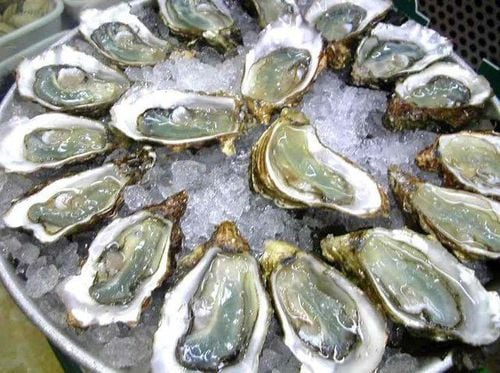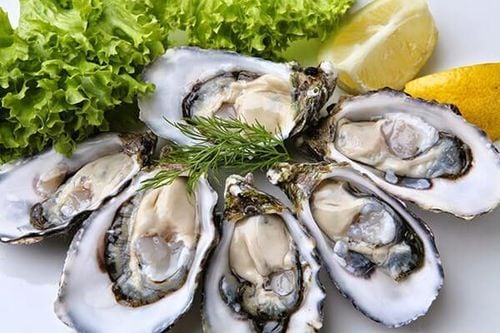This is an automatically translated article.
Sea oysters are a delightful dish of pure sea taste. Fans say the oysters are chewy, distinctive and have a fresh taste. Oysters are a popular seafood loved by gourmets around the globe. So what are the benefits of eating oysters? The following article will help you better understand the effects of eating oysters.
1. The hidden benefits of oysters
Oysters are saltwater bivalve molluscs that live in marine habitats such as bays and oceans. They are a very important part of the ecosystem, filtering pollutants out of the water and providing habitat for other species, such as macaws and clams. There are many different types of oysters - their fragrant, golden flesh is considered a delicacy around the world.Evidence of human consumption of shellfish dates back to 164,000 years. Fast-forward to about 2,000 years ago, history shows that the Romans in England enjoyed this savory seafood dish. In the US, oysters were considered an inexpensive food mainly enjoyed by the working class in the early 19th century. They peaked between 1880-1901 when the United States produced 160 million pounds of oyster meat per year. five.
Oyster production has declined significantly over the past century, partly due to habitat destruction and reduced demand. However, they are still a popular seafood favorite among gourmets around the globe.
Here are the impressive health benefits of oysters:
1.1 Nutritional value of oysters The outside of sea oysters is a hard, irregularly shaped shell that may have moss on the surface. The inner part of the shell is plump and gray in color. The part used for food is the flesh inside the outer shell – which is rich in nutrients.
In fact, a 3.5-ounce (100-gram) serving of wild oysters provides the following nutrients:
Calories: 68 Protein: 7 grams Fat: 3 grams Vitamin D: 80% of the recommended amount Daily Intake (RDI) Thiamine (vitamin B1): 7% RDI Niacin (vitamin B3): 7% RDI Vitamin B12 : 324% RDI Iron : 37% RDI Magnesium : 12% RDI Phosphorus: 14% RDI Zinc : 605% RDI Copper: 223% RDI Manganese: 18% RDI Selenium: 91% RDI Oysters provide a small amount of calories but are packed with nutrients, including protein, healthy fats, vitamins and minerals.
For example, a 3.5-ounce (100-gram) serving provides about more than 100% of the RDI for vitamin B12, zinc and copper, and more than 75% of your daily needs for selenium and vitamin D.
The flesh of oysters is also a good source of omega-3 fatty acids, a family of polyunsaturated fats that play important roles in your body like regulating inflammation and keeping your heart and brain healthy. you are healthy.
Research shows that people who eat a diet rich in omega-3 fats have a lower risk of conditions like heart disease and type 2 diabetes.

Ăn hàu biển có tác dụng gì là thắc mắc của nhiều người
Vitamin B12: Vitamin B12 is very important for the maintenance of the nervous system, metabolism and blood cell formation. Many people do not get enough of this vitamin in their diets, especially the elderly. Zinc: This mineral plays an important role in immune system health, metabolism, and cell growth. A 3.5-ounce (100-gram) serving of oysters provides more than 600% of the body's zinc needs. Selenium: This is a mineral that plays a role in metabolism and maintaining thyroid function. It also acts as a potent antioxidant, helping to prevent cell damage caused by free radicals. Vitamin D: Vitamin D is known to be essential for the immune system, cell growth, and bone health. The diets of many people do not provide the necessary vitamin D requirements, especially those in colder areas due to lack of sunlight. Iron: Iron is an essential element for the body's life, they have the function of creating hemoglobin and myoglobin, proteins that carry oxygen throughout the body. Many people do not provide enough iron according to the body's needs through the daily menu. In addition to their various roles in health, many of these nutrients also provide antioxidant protection. For example, selenium is a powerful antioxidant that helps protect your body against oxidative stress, an imbalance that occurs when excessive amounts of free radicals are generated. Oxidative stress is linked to a range of chronic diseases such as cancer, heart disease, and mental decline. Zinc and vitamin B12 and vitamin D found in oysters also have antioxidant effects. Research shows that people who eat a diet rich in antioxidants have a reduced risk of heart disease, diabetes, some cancers, and all-cause mortality.
1.3 High Quality Protein Source Oysters are an excellent source of high quality protein, with 3.5 ounces (100 grams) of finished product packing in 7 grams of this filling nutrient. Oysters are a complete source of protein, which means they contain all nine essential amino acids your body needs. If you're looking to lose weight, adding oysters to your main meal source and plus a few snacks can help promote feelings of fullness and encourage weight loss.
Protein-rich foods help reduce hunger by increasing levels of satiety-promoting hormones such as peptide YY and cholecystokinin (CCK). Higher protein diets have been shown to be effective in promoting weight loss and leading to more weight loss than low-fat or higher-carb diets. According to one study, a high-protein diet may also be beneficial for blood sugar control, especially in people with type 2 diabetes. For example, a review of nine studies demonstrated It has been shown that a high-protein diet significantly reduces hemoglobin A1c levels - a marker of long-term blood sugar control - in adults with type 2 diabetes. Furthermore, a high-protein diet may reduce these risk factors for heart disease in people with type 2 diabetes.
A review of 18 studies in people with type 2 diabetes found that a high-protein diet significantly reduced blood levels triglycerides - a major risk factor for heart disease.
1.4 Contains Unique Antioxidants In addition to being a food rich in nutrients and vitamins, oysters also contain a unique antioxidant, 3,5-Dihydroxy-4-methoxybenzyl alcohol (DHMBA has antioxidant effects). One test-tube study found that DHMBA was 15 times more resistant to oxidative stress than Trolox (a form of vitamin E now commonly used to reduce the effects of oxidative stress). ) Several test-tube studies have shown that DHMBA from oysters may be particularly beneficial for the liver. From the above in vitro studies, DHMBA may be useful in preventing or treating future liver diseases, but more research is needed. complements this problem because current research is limited to in vitro experiments.In addition, another study in n test tubes show that DHMBA reduces the oxidation of LDL cholesterol (bad fats). Cholesterol oxidation is a chemical reaction linked to atherosclerosis (plaque buildup in your arteries), a major risk factor for heart disease.
Although these results are promising, further research is needed to determine whether DHMBA is effective against oxidative stress in humans.

Ngoài tác dụng ăn hàu biển đem lại thì hàu sống có thể chứa vi khuẩn
2. Some Oyster Hazards to Watch Out for
Although the benefits of eating oysters have been proven by scientific studies, there are some potential risks associated with eating oysters, especially raw oysters.2.1 May contain bacteria Eating raw or undercooked oysters can lead to a higher risk of bacterial infection. Vibrio bacteria - including Vibrio vulnificus and Vibrio parahaemolyticus can congregate in filter-feeding shellfish. Therefore, eating raw may increase the risk of exposure. Gastrointestinal symptoms experienced with infection with these bacteria such as diarrhea, vomiting, fever, and more serious conditions, such as sepsis, are therefore potentially life-threatening.
2.2 Other Contaminants Oysters can also carry certain Norwalk-type viruses and enteric viruses so contact with oysters can contaminate these viruses posing a health risk. In addition, these molluscs, depending on their habitat, can include many toxic substances such as heavy metals such as lead, cadmium and mercury. Due to the potential health risks, children, people with compromised immune systems, and pregnant or breastfeeding women should avoid eating raw seafood. Those who choose to eat raw oysters need to be aware of these potential risks. At this time, there is no way to guarantee they are safe to consume in their raw form. Therefore, the recommendation of the health authorities is to use only when cooked.
2.3 Other Risks Oysters contain an exceptionally high amount of zinc, although being an essential element for the body, a large amount of zinc accumulation in the body can be counterproductive. While zinc toxicity is often linked to supplements, eating too many oysters regularly can lead to negative health effects such as decreased levels of the minerals copper and iron, which zinc competes for absorption. .
As they can be dangerous to your health, choose to buy fresh oysters and cook them properly. It is much safer to eat cooked oysters because cooking kills harmful bacteria
Here are some delicious and easy ways to add oysters to your diet:
Add cooked oysters to your dishes. noodles. Wrap whole oysters in breadcrumbs and foil. Serve them cooked with their skins on and topped with fresh herbs. Add oyster meat to soups and seafood stews. Fry oysters in coconut oil. Steam, then top with lemon juice and butter. Wrap the oyster halves in the marinade of your choice and grill on the griddle. Here are some safety tips to consider when buying oysters:
Only choose oysters with closed shells. Get rid of things with open shells. According to the Food and Drug Administration (FDA), oysters that do not open during cooking should also be discarded. Do not cook too much at once in one pot, such as when boiling, as too much can lead to some dishes being overcooked.
Please dial HOTLINE for more information or register for an appointment HERE. Download MyVinmec app to make appointments faster and to manage your bookings easily.













